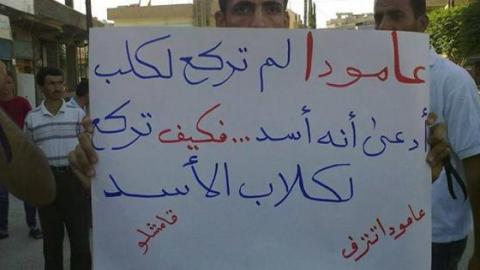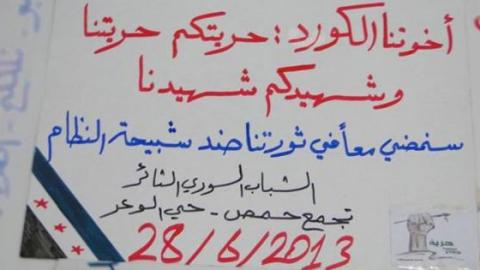“He who kills his people is a traitor.”
First chanted outside the Libyan Embassy in Damascus in February 2011, and later repeated as a message to Syrian security forces who were shooting at unarmed protesters, this was one of the first slogans of the Syrian revolution against President Bashar al-Assad. Now, Kurdish Syrians in the city of Amuda in northeastern Syria are using the slogan once again; this time against the Democratic Union Party (PYD), which is the political wing of the Kurdistan Workers’ Party (PKK).
PYD forces recently arrested a group of activists who led the city’s nonviolent civil resistance movement, after charging them with a number of unfounded claims. In response, about 100 protesters held a sit-in on June 27 condemning the actions of the PYD, who they accused of denying people of their freedoms. They held signs with messages such as, “Amuda did not kneel to Assad, and will kneel to no one else” and “The regime occupied Qusair with the help of Hezbollah, and occupied Amuda with the help of the PKK.”
Throughout the Syrian revolution, the PYD has been accused of collaborating with the Assad regime, and has helped the regime silence the voices of members of the opposition, including the renowned Kurdish opposition figure Mashaal Tammo, who was shot dead early in the revolution.
The Kurdish militias opened fire onto this group of unarmed protesters, killing seven people and injuring more than 40. They also arrested a number of leaders of the Kurdish National Council (KNC). It was these actions that pushed the city’s Kurds to repeat, “He who kills his people is a traitor,” as they remembered the regime’s initial, violent response against Syrian protesters. Benkin, political activist in the Kurdish Yekiti Party in Syria, said to Syria Untold, “Regime forces never dared shoot at protesters in Amuda, but the PYD is trying to quell any civil movement that questions its authority in the city. The regime has succeeded in pushing areas of sectarian friction into civil war, and in pushing the Kurdish people into fighting one another.”
A nonviolent activist from Amuda, Sewar, said, “We don’t want armed militias to monopolize the city, especially since they have clear ties to the Syrian regime.” The Amuda coordination committee, of which Sewar is a member, has played a major role in organizing the nonviolent opposition movement in the city. Rogine, a member of Shawishka, a Kurdish women’s group, said, “Not only do weapons remind us of the initial protest movement, and the way in which women were sidelined, they also eliminate the core of the civil Kurdish movement.”
The KNC, which represents all Kurdish political groups except the PYD, released a statement calling on activists to remain nonviolent, and not be drawn to carrying weapons in the face of the PYD. One of the council’s members, Siban, said to Syria Untold, “The PYD poses a regional threat. Carrying arms against these militias will only draw the Kurdish regime into a bloody struggle that will help no one. Kurdish youth must arm themselves only with organized, nonviolent protest.”
Amuda’s youth are insistent on continuing their civil resistance without taking up arms, especially since they don’t stand a chance militarily against the PYD, which is very well armed and is backed by regional powers. They don’t want to drag Syria’s Kurds into an armed conflict. One of the activists who was at the protest that PYD forces fired at, Dirsem, said, “We will escalate our civil resistance against the PYD, and we will not resort to violence. We don’t want to turn this into an armed conflict. Rather, it will remain a conflict between one group that resorts to violence, and one group that responds nonviolently.”
It was not only Amuda’s activists who protested the PYD’s actions. One June 28, a group of intellectual Kurds in the city of Qamishli held an anti-PYD protest in front of Qasmo Mosque. PYD militias attacked the demonstrators with sticks and knives, abusing them physically and verbally. They yelled at the protesters in Kurdish, saying, “Show us how you’re going to keep demonstrating.” They also raided the house of a person they suspected of sheltering the protesters, and accused them of working for Turkish President Recep Tayyip Erdoğan. One of the city’s most renowned media activist, Farhad Ahmi, was severely beaten.

Protesters in Qamishli stand in solidarity with Amuda. Source: Amuda coordination committee
In Latakia, members of the Bees of the Coast movement held a sign that read, “Azadi (Kurdish for freedom), we are calling for freedom for Amuda. Here is Latakia, where the sea, the mountains and the valleys say: Amuda is part of my country.” In Homs, the Syrian Revolutionary Youth group held a sign that said, “To our Kurdish brothers: Your freedom is our freedom, and your martyrs are our martyrs. We will continue in our revolution against the regime’s thugs.”
The city of Kafranbel also expressed its solidarity. Protesters there held a sign that said, “Amuda: A revolution that was started by the pen and that was met with bullets; Amuda: In the eyes of your children, we see the future of Syria.”

A sign held by the Revolutionary Syrian Youth group in Al-Waar, Homs in solidarity with Amuda. Source: Revolutionary Syrian Youth official Facebook page



